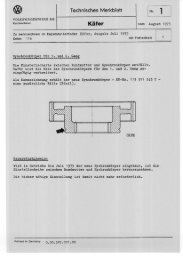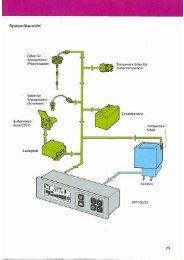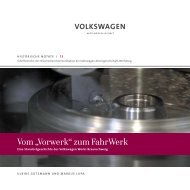HN 2: The British and their Works
HN 2: The British and their Works
HN 2: The British and their Works
You also want an ePaper? Increase the reach of your titles
YUMPU automatically turns print PDFs into web optimized ePapers that Google loves.
Some of the firms named by the Highways <strong>and</strong> Highway<br />
Transport Branch were unknown to the Volkswagenwerk <strong>and</strong><br />
had to be examined on the spot. This job was undertaken by the<br />
"Reisedienst" (field representatives service), set up in August<br />
1946, which consisted of two engineers. It maintained contact<br />
with the <strong>British</strong> departments <strong>and</strong> the German dealers. <strong>The</strong> latter<br />
were not only advised, but at the same time subjected to a strict<br />
quality control. However, the mobile inspectors were sometimes<br />
harsh, as the main distributor in Essen, Gottfried Schultz<br />
found out in no uncertain fashion at the end of April 1947.<br />
With purpose-built premises, good mechanical equipment<br />
<strong>and</strong> 160-180 vehicle repair throughputs per month, his workshop<br />
occupied a leading position among the main distributors.<br />
However, as he read in the inspection report, "the work it does<br />
can scarcely even be called mediocre", <strong>and</strong> it failed to come up to<br />
Volkswagen expectations "by a long way". 146 <strong>The</strong> main reason for<br />
this was given as the absence of suitable management for the<br />
technical operation, <strong>and</strong> inadequate supervision of fitting by<br />
the foremen <strong>and</strong> supervisors. <strong>The</strong> inspector therefore undertook<br />
minor changes in the work organisation. In a discussion with<br />
the works council <strong>and</strong> management he recommended transfers<br />
in the workforce.<br />
In return, the Volkswagenwerk allowed its dealers to make<br />
critical observations, with the result that gradually an exchange<br />
of ideas developed from which both sides gained. At a management<br />
meeting in mid-July 1947 general manager Münch said<br />
that in the foreseeable future the Volkswagen must successfully<br />
compete with other vehicles. It was therefore important to listen<br />
to the views of the VW dealers concerning sale of the products.<br />
Gottfried Schultz submitted a list of parts, of which his firm had<br />
not one single example in its store. This included connecting<br />
rods, crankshafts, roundhead bolts, steering gear, kingpins <strong>and</strong><br />
gearsticks. For lack of these replacement parts, half the<br />
Volkswagen fleet of the post office in Düsseldorf <strong>and</strong> Hanover<br />
was out of action. <strong>The</strong> Essen main distributor presented various<br />
cases of complaint from the experiences gathered by his workshop.<br />
His suggestions for improvement were individually<br />
discussed <strong>and</strong> passed to the technical management. 147 Overall<br />
there developed a partnership based on mutual confidence<br />
between the main distributors <strong>and</strong> the motor manufacturer,<br />
which was partly evident from the amicable relationship<br />
between Gottfried Schultz <strong>and</strong> Heinrich Nordhoff.<br />
Like the dealer network in the <strong>British</strong> zone, the service department<br />
also developed in a promising way. Its growing importance<br />
was underlined in the course of 1946 by organisational<br />
reforms, beginning with the subdivision of the service department<br />
into the parts department, the technical department <strong>and</strong><br />
the service school. In September 1946 the general manager had<br />
been submitted the idea, presumably by Karl Feuereissen, that<br />
the service department must always be subordinate to Sales,<br />
the reason being that the sole determinant was the car-buyer,<br />
<strong>and</strong> the entire factory had to be oriented to this fact. This call<br />
for the attitude that "the customer is always right" may have<br />
seemed a little out of place in the conditions of the deficit economy,<br />
but it signalled a gradual change of perspective. In any<br />
case, at the end of 1946, Sales, which had previously been subordinate<br />
to the finance department, was attached to the main<br />
department of Service, <strong>and</strong> both moved into new premises. 148
















